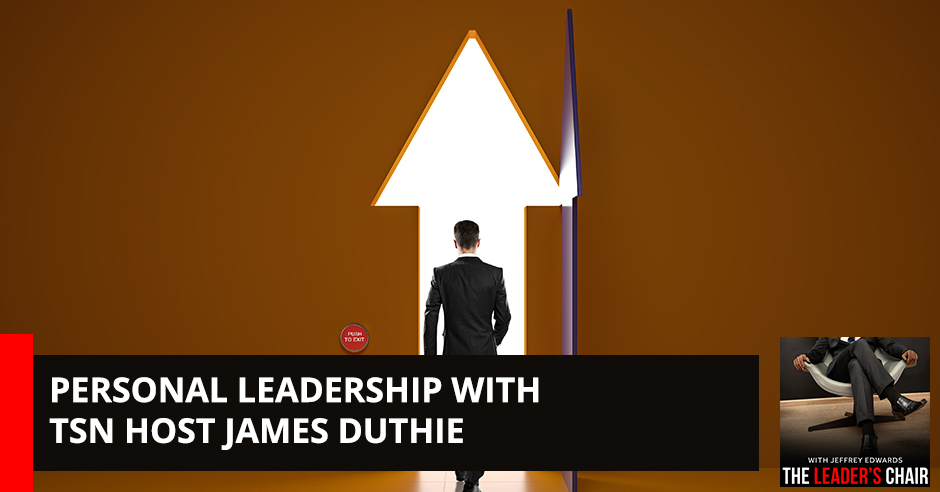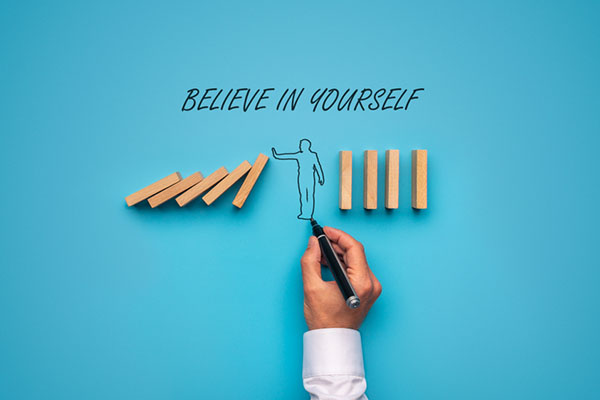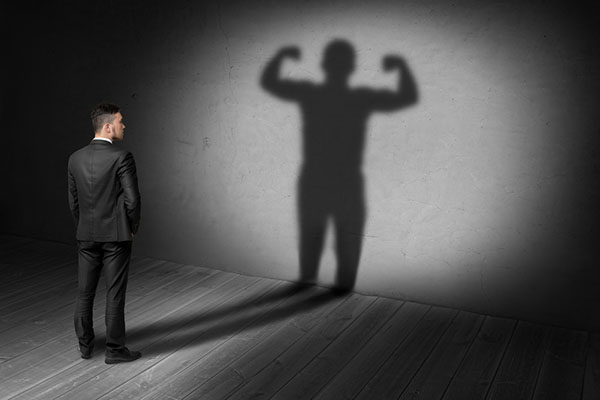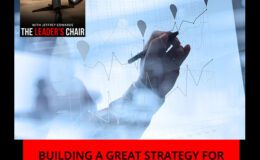
Leadership doesn’t always have to mean standing in front of a team making a speech. Sometimes, it just means being a good example. This is what award-winning TSN Canada Sports Network host James Duthie learned in his years as a sports broadcaster for Canadian television.
Being exposed to sports for the bulk of his career, Jame’s insights on leadership draws from the industry. In this episode, I chat with James to discover how to apply those same skills in our personal lives.
Check out this episode if you want to learn:
- Which leadership lessons to take from athletes
- Why being yourself will get you the furthest in life
- How to make insecurity work for you
🎧 Listen to the podcast here:
Personal Leadership With TSN Host James Duthie
Did you ever imagine yourself having this career?
I used to turn down the TV and do play-by-play on NFL and NHL games when I was a kid. I did not ever think that I would get to do that. My dad was a conservative guy, an RCMP officer in Canada. Growing up in the suburbs of Ottawa, we’d watch the local sports station, (and I would say), ‘If I could be the local sports anchor, that would be unbelievable.’ I’ve never thought beyond that, being on a national network and getting to cover Masters, Super Bowls and (the) Olympics. Maybe (once) I arrived (at) TSN did I think that was possible.
'Everybody needs that one person who believes in them somewhere along the way.' Share on XWhat advice do you have for journalists just starting their careers?
(It’s about) believing in yourself and (having) confidence, like almost any other industry. I remember one of my university profs – I did a TV story, and he wrote on the top of it, ‘I think you could do this for a living.’ That was the first time that I ever believed that was possible, which shows you the importance of a teacher. I lacked confidence like anybody else who’s going through high school or university. There’s so much uncertainty in your world. That belief in yourself is so important.
As far as skills for a broadcast journalist, I became a good writer, writing for television and radio. That’s a skill that I see that a lot of people don’t have in broadcasting. I always tell young broadcasters, ‘work on your writing ability as much as possible.’
Your teacher implanted the belief in you that this career could be possible. Who else in your life has done that for you?
I was fortunate enough, first of all, to have two parents who were very supportive, despite what I said about my dad being a conservative guy. They were like, ‘do whatever you want, and we will support you.’
People aren’t always fortunate to have two parents like that. Sometimes you have to look elsewhere. In my first job, there was a guy named Max Keeping, a news anchor in Ottawa. If that prof in Carleton was the first one to believe in me, then Max was the first one at a professional level who said he saw something in me.

Personal Leadership: Believe in yourself. It is a very important thing to do in an uncertain world.
I always think you need that one person who believes in you somewhere along the way. I know it’s frustrating for people if you can’t find that person. If you work hard enough, somewhere along the way, you’ll get that person who sees something in you and says, ‘This guy is worthy of my support.’ I owe my entire career to Max, because he’s the one who hired me. Other people at the station didn’t want to hire me because I was too young — I was the news reporter and I wanted to do sports. Max gave me the opportunity.
At TSN, I’ve had a number of people who’ve been that supportive. I (also) have a weird friends’ group where probably my 10 best friends in the world, they’re all from grade three and four, and we stayed together. Those are still the guys that I trust to bounce things off of, if I maybe don’t feel confident (going to) a colleague.
Whatever feedback they give you is going to be real, because they want to support you.
You’ll never have anything in your life like your closest friends. Even if they don’t understand your business, they’re still the people that you can go to and bounce something off of. When you feel completely free to trust them — that’s the most invaluable thing in the world.
You’ve interviewed world-class athletes, stars in entertainment, sports. What do you hear from them, in terms of their approach to life?
'If you can take that fear of failure and spin it into something that pushes you to be better, then that’s a good thing.' Share on XSupreme confidence, first of all. That doesn’t mean cockiness — I work with a lot of athletes who are super nice guys. That’s an unbelievable skill, too — the guys who are modest about their abilities, but have absolute, 100% belief in themselves. Those are the athletes I’m most impressed with. A lot of hockey players are like that. It’s ingrained in them to not be too show-boaty, but to still have that confidence.
The other thing would be competitiveness. The most common characteristic I see in the elite of the elite athletes is that absolute (mentality of) ‘I have to win.’ It’s funny because it’s not an admirable trait; Sidney Crosby’s agent once told me a story about having Sidney over for dinner. The agent had an eight year-old boy, and Sidney was playing checkers against the boy while dinner was being prepared. The kid beats Sidney, (and Sidney) hits the checkerboard. Two seconds later, he was horrified, picked up the checkers and apologized to the kid.
In that moment, the thought of losing made him so angry. Anybody who’s watched the Michael Jordan documentary that’s airing everywhere about the Chicago Bulls and his ferocious competitiveness — all those guys: Gretzky, Crosby, McDavid from hockey, Jordan – they can’t live with the idea of losing. It’s almost a sad thing in a way — I’ll talk to athletes at the end of their careers, (who) tell me they (won) three Super Bowls, but they’ll remember the ones that they lost more, because it bothers them so much to lose.
As far as our everyday life, we can’t all be that way. You don’t want to be the guy who’s chucking something around in a meeting when things don’t go your way. (The) desire to be successful has to burn in you a little bit more than the next guy. Whether it’s a project you’re working on, a PowerPoint or a speech — you have to want to make it a success more than anybody else. That’s the way that athletics translates to everyday life.
It’s OK to own it – to say, ‘I want this’, and to go after it.
You don’t have to be a jerk about it. Internally, you can still want it badly. If I’m broadcasting the Gold Medal Game of the World Junior Hockey Championship, and I know that’s going to be one of my most-watched events of the year, I will prepare as much as possible, so that I can do the best show possible. I know that everybody tuning (in) doesn’t care about me — they’re there to watch the hockey game. For me, having a good performance and doing a good broadcast — that’s my gold medal. Maybe other people aren’t going to notice, but I have to hope that when I sign off at the end of the broadcast, I’m going to feel, (for) myself, that I did everything possible to make it a good show.

Personal Leadership: You can be confident and competitive without being a jerk about it.
You’re in front of millions of people. How do you recover when you make a mistake?
If an average person working in a normal office has a bad day, maybe their boss knows about it, or a couple of their colleagues, but nobody else does. Whereas if you have an off day, one million people know about it. That’s one of the weird things about (this) job — I don’t know that you ever get used to that. I used to take it hard; I remember driving home after doing a show, where maybe I made a big mistake, (and I was) cursing at myself saying, ‘You suck.’ I’ve gotten better at that. Things wash off me a little better as I get older, and I have a better perspective of life having three children.
It still frustrates you, because you look like an idiot in front of everyone. I’m as insecure as the next person. A lot of people are insecure, and people hide it differently. Insecurity drives you in business or in life. There’s always a thought in the back of your mind: ‘I’m a fraud, I don’t belong in this job, I didn’t earn this.’ It’s a great motivator.
If I was to psychoanalyze myself, I prep hard. After 30 years, I could probably sit here and go on and do a show, and I’d be fine — but I still prepare for it like it’s an exam, because I don’t want to screw up. There’s that fear of failure in the back of your mind that you’re going to be revealed to be this fraud at what you do. We all have a little bit of that. If you can spin it into a positive, and if that pushes you to be better, then that’s a good thing.
You don’t take your success for granted — you’re always looking for ways to improve.
The failure that happens in sports — and in life — is (when) people reach a plateau and say, ‘I’m here now. I did all the work. I made it.’ That’s the end of the movie, roll the credits. The most successful people in any business get there, and then work even harder to stay there.
'The most successful people in any business work hard to get to the peak and work even harder to stay there.' Share on XHow do you use your platform to impact others?
The one thing (my career) has allowed me to do is to get involved and to help out. Hayley Wickenheiser (and) Ryan Reynolds (are) helping to get PPE to healthcare workers. They reached out to me, and I was so grateful to be able to help.
Jonathan Pitre in Ottawa — The Butterfly Child — was a kid who was born with a rare skin disease. He went through an incredibly painful life. One of his dreams was to be a sportscaster. I don’t think I would have ever got to meet him under any other circumstance, but I was able to bring him to TSN, and we formed a friendship. He passed away (a few) years ago.
To me, the greatest part of my job is that it allows me to get to know these people, and give back in some small way here and there. That’s by far the most satisfying element of what I do.
I’m (also) part of an organization called Children Believe, and I’ve done some trips with my children to Africa and Central America.
Everybody can contribute in some way, but (my job has) allowed me to do some things (to make an impact), and I’m grateful for that part of it.
When I speak with other people about you, it’s always mentioned how natural you are.
That’s one thing with television and that should apply everywhere: you have to be yourself. People are smart enough to read if you’re not being yourself. Sometimes I’m too much of an idiot or too immature on television or on my podcast – but you have to be you. Take the good things and the bad things that come with being you, and realize that not everybody’s going to like you – especially in a place like television. It’s much easier.

Personal Leadership: Be yourself. People are smart enough to read if you’re not being yourself.
📌 Important Links:
Love the show? Subscribe, rate, review, and share!
Join The Leader’s Chair Community today on Facebook and Twitter.





